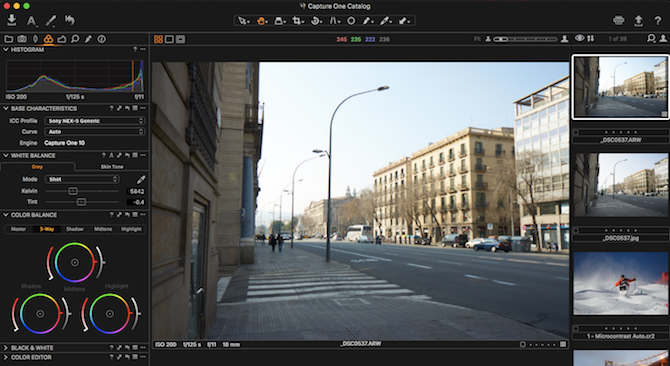
Adobe Lightroom is the default photo management and editing app for many photographers. But where you could once buy the program and use it for as long as you wanted, it’s now only available through a subscription. Which is a model that doesn’t work for everyone.
What are the best Lightroom alternatives? Can you get the best features of Adobe Lightroom free of charge, or at least for just a single, one-off price? Here are your best options.
The Best Lightroom Alternatives in 2019
Adobe Lightroom isn’t for everyone. So, if you’re searching for another option, here are the best Lightroom alternatives in 2019.
1. Capture One Pro

Capture One Pro is the closest thing to a direct replacement for Lightroom, although the starting price of $299 makes it a tool for professionals and very serious hobbyists only.
The feature set is impressive. You can migrate your catalogs over from Lightroom. There’s support for RAW files from more than 400 cameras. The editing tools are comprehensive, and presented in a very visually appealing manner. And there are lots of pro-level functions, including support for tethered shooting, with live view.
Capture One Pro is likely to be overkill for many users. But there is a trial available, so you can easily test it out for yourself.
Available for: Windows, Mac
More Information: PhaseOne ($299, Free trial available)
2. DarkTable

At the opposite end of the spectrum to Capture One, there’s DarkTable. It’s free and open source, but still replicates the core functionality of Lightroom.
DarkTable offers detailed asset management and decent editing options. Its RAW processing support for over 400 cameras is well regarded by its users. It also includes tools that have been omitted from Lightroom CC, including split toning and curves adjustments.
On the downside, DarkTable’s interface lacks the finesse of its commercial counterparts.
Available for: Mac, Linux, Windows
More Information: DarkTable (Free)
3. Adobe Bridge

Long before Lightroom, Bridge + Photoshop was the setup of choice for many photographers. Adobe Bridge is the asset management part of that combination.
It’s still available, it’s still a good Lightroom alternative, and it’s one of the best free Adobe apps you can use. You need an Adobe account to download it, but a basic, non-paid account is fine.
Bridge handles all your cataloging needs. You can organize your images into folders and collections, add star ratings, apply keywords, view metadata, and so on.
Adobe Camera Raw isn’t included in the free version, so you do need to add your own RAW processor if you’re shooting RAW. You also need to add your own editing app—GIMP is a great free Photoshop alternative, or take a look at Affinity Photo as an affordable paid option.
Available for: Windows, Mac
More Information: Adobe (Free)
4. DxO PhotoLab

Formerly called OpticsPro, PhotoLab is a pro-level image editing app that competes with Capture One and comes at a similar price to Lightroom 6. The feature set is comparable, too, with the inclusion of full asset management, so you can import and organize your images. This was missing in the old version of the software.
The editing features from Lightroom are all in place, and it’s easy to use and very responsive. The noise reduction capabilities in particular are highly rated. On top of that are some basic local adjustment tools, and RAW support extends to 400 cameras. It all adds up to a quality tool and is a viable alternative to Lightroom for most users.
Available for: Windows, Mac
More Information: DxO ($99–$149, Free trial available)
5. RawTherapee

RawTherapee is primarily a standalone RAW processor with wide camera support. It’s as much an alternative to Adobe Camera Raw as Lightroom, but with some basic digital asset management features it’s still worth considering.
RawTherapee won’t import your images and sort them into folders for you—you need to do that some other way. But once they’re there you can apply colors and ratings to help keep track of your best images.
The RAW capability has a strong reputation among the enthusiast crowd. This is especially true for users of Fuji cameras, which produce notoriously challenging RAW files. There is a certain learning curve to the app, but it rewards the time you put in.
Available for: Windows, Mac, Linux
More Information: RawTherapee (Free)
6. Skylum Luminar 3
Luminar is one of the most affordable Lightroom alternatives, but that doesn’t make it light on features. It includes AI tools that recognize the content of your images, and allow you to make selective adjustments far more easily. You can change the exposure of the sky, for instance, without touching the people in the foreground.
There are bags of filters, powerful sharpening options, ways to reduce noise in your photos, and most of the retouching tools you’d expect from Lightroom. The Gallery lets you import, organize, and manage a large library of photos, too. It’s a great app and well worth a look.
Available for: Windows, Mac
More Information: Skylum Luminar 3 ($69, Free trial available)
7. ON1 Photo RAW

ON1 Photo RAW is a relative newcomer to the market. It combines the best of Lightroom—cataloging and organization tools plus fast RAW processing—with a few concepts from Photoshop, including layer support. This enables you to composite images together in a way you cannot do in other Lightroom alternatives.
It’s fast, and has strengths in making local adjustments and working with effects and filters. But it does suffer a little from a cluttered interface that hides important tools while also causing you to rethink your workflow.
Available for: Windows, Mac
More Information: ON1 ($119, Free trial available)
8. ACDSee Photo Studio Professional
ACDSee Photo Studio Professional is a Windows program that has clearly got Lightroom in its sights. Priced at $99.99, it has all the main features of Adobe’s app, plus some extras of its own.
You get comprehensive cataloging and organizing tools, and a thorough RAW editing mode with support for more than 500 cameras. But you also get things like a Liquify tool that enables you to retouch photos by moving groups of pixels without altering them. You’d normally have to switch to Photoshop for that.
Available for: Windows
More Information: ACDSee ($99, Free trial available)
9. Apple Photos

Finally, what of Apple and Google’s Photo apps? The chances are you are already use either of them on your phone. Can they give you the best features of Lightroom for free?
Apple Photos is very good for photo management, and it plays nicely with your third-party editor of choice. The addition of tools like a tone curve and definition slider have made it easier to get the kinds of results you’d expect from Lightroom. RAW support is built into macOS, so the app works with a large number of cameras.
Photos includes cloud storage for all your images. See our guide on how to use iCloud Photos to learn how to get the most from that.
Available for: Mac
More Information: Apple Photos (Free)
10. Google Photos

Google Photos is entirely cloud-based, and runs in the browser on your desktop. That may make it a total non-starter for you. But the processing capabilities are excellent. It benefits from the technologies carried over from apps like Snapseed, as well as from Google’s machine learning algorithms. It also has some limited support for RAW files.
Google is great for organizing your shots. You don’t need to worry about adding keywords, as it automatically identifies things in your shots and produces them upon a simple search. It isn’t so good for managing big shoots, though.
Available for: Windows, Mac, Linux, Chrome OS
More Information: Google Photos (Free)
Take Your Pick of Lightroom Alternatives
Lightroom got to the top for a reason. Whatever quirks it may have, it is the best at what it does. But the competition is catching up. If you don’t want to pay for a Lightroom subscription, you’ve got some fantastic options that you can either pay for outright or get for free.
One of the main considerations when picking your Lightroom alternative is how good the RAW processing is. Not all apps are as good as one another in this regard, and some will produce better results with certain cameras than others.
For this reason, you should definitely download and test the trial versions where they’re available. See how they well fit both your gear and your workflow.
Want more free replacements for expensive software? Check out our guide to the best free alternatives to Lightroom, Photoshop, and Illustrator for a comprehensive rundown.
Image Credit: clearviewstock/Depositphotos
Read the full article: The 10 Best Lightroom Alternatives (Free and Paid)
from MakeUseOf https://ift.tt/2GLI4p1

No comments:
Post a Comment